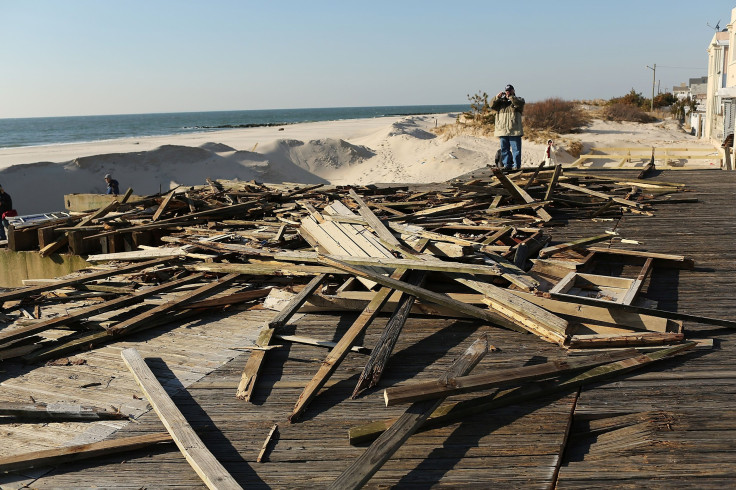Hurricane Sandy FEMA Talks: Judges Rip 'Mind-Blowing' Proposal To Silence Storm Victims On Fraud Allegations

Federal judges on Wednesday tore apart a confidentiality form introduced during FEMA negotiations with Hurricane Sandy victims. The document would have required homeowners to give up their right to cooperate with state and federal investigations into allegations of fraud, in exchange for a settlement.
“This is so far over-reaching, it’s mind-blowing,” U.S. Magistrate Judge Ramon Reyes Jr. said during a hearing Wednesday afternoon in a Brooklyn federal court. That’s where a panel of judges overseeing Hurricane Sandy insurance disputes has insisted on exploring allegations that insurers used fraudulently altered engineering reports to lowball claims.
The allegations revolve around a number of private insurance companies that administer policies for FEMA’s National Flood Insurance Program, and touched off an ongoing criminal investigation by the New York Attorney General’s office, as well as an inquiry at FEMA. While some 1,500 flood insurance lawsuits are pending in New York and New Jersey courts, an attorney for homeowners, Steve Mostyn, has estimated that up to 10,000 people in the region could have been affected by problematic damage reports.
Mostyn is now negotiating, with FEMA officials, a framework for monetary settlements and program reforms, and Tuesday he requested a hearing from judges on “troubling developments”: a proposed release form that Mostyn said would silence homeowners, prevent them from assisting law enforcement investigations, and release insurance companies -- known as “WYOs” in the flood insurance program -- “from any and all criminal liability for their fraudulent acts.”
The Texas-based lawyer cited a nearly page-long “confidentiality” section in a document bearing the name of Travelers Insurance.
“In essence, the WYO carriers want FEMA – a federal agency investigating the WYO carriers – to pay the Plaintiffs money to keep them from cooperating with FEMA’s own investigation into the WYO carriers, not to mention any other investigations,” Mostyn wrote, attaching a copy of the release document to the court’s public record.
(Attorney General nominee and U.S. Attorney Loretta Lynch, who represents FEMA in the litigation, has motioned to strike Mostyn's letter from the court docket, on the basis that it contains draft documents from settlement negotiations.)
At Wednesday’s hearing, which Mostyn joined by telephone from Austin, Texas, he said the release constituted “extremely bad faith.”
“This is something that blew our entire negotiations up,” Mostyn said.
U.S. Magistrate Cheryl Pollak said the proposed release could be illegal. “I have major concerns with this language as being a violation of New York state and federal laws,” she said.
Attorneys for FEMA and flood insurance carriers quickly distanced themselves from the document, insisting that it was never intended as a final proposal, and didn’t reflect Travelers’ position, or that of other private insurers.
Barbara Montoya, an acting associate chief counsel for FEMA, said that Standard Fire Insurance Company, a unit of Travelers, provided the release as a “starting point” for negotiating, not as a “final document.”
Attorney Stephen Goldman, who represents Standard Fire, apologized to the court for any “confusion” the release document may have caused. Goldman said that FEMA was in a hurry to get a document as one group of claims involving engineering reports neared a settlement agreement, and that he did not review the release beforehand. “It did go out the door in a rush,” he said.
To which Judge Reyes said, “Mr. Goldman, shame on you for letting your client send something out without your review.”
John Michael Pennekamp, a liaison counsel for the various flood insurance companies involved in the New York litigation, said that insurance carriers, as a group, were not consulted for their input “regarding language to be in a release” until later in the day Tuesday.
“I don’t know if FEMA reached out to any individual companies” before that, Pennekamp said.
But, he added: “This is not WYOs as a big group. This was one release.”
Judge Gary Brown pushed attorneys to state whether anyone at the hearing was actually in favor of a clause that would prevent policyholders from taking part in government investigations. "No one is arguing to keep that in?" he asked.
The answer was no.
The panel told the lawyers to get back to work. “We need to get the negotiations and the discussions back on track,” said Judge Pollak.
© Copyright IBTimes 2024. All rights reserved.











